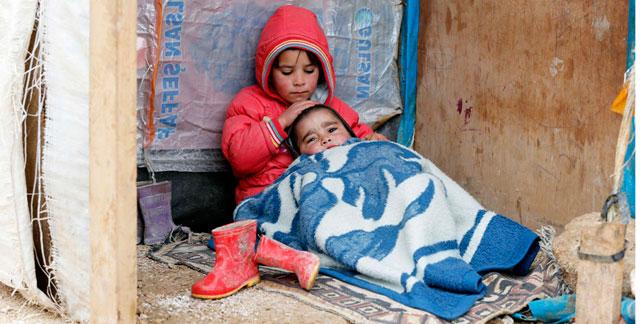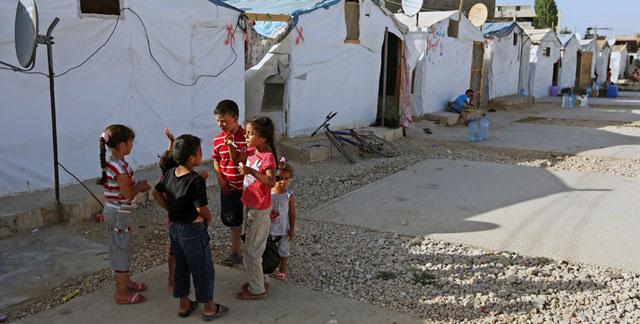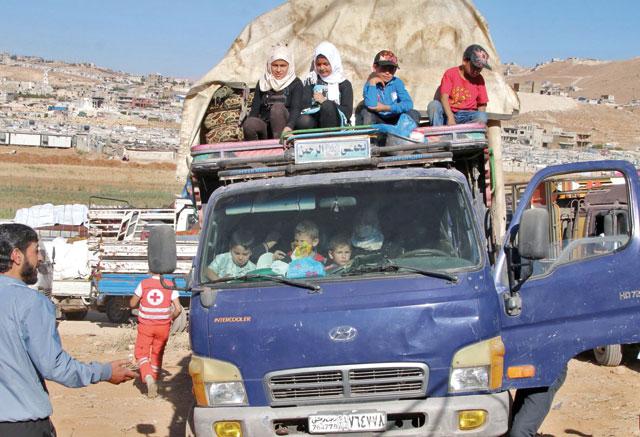You are here
Flooded with refugees, Lebanon imposes visas on Syrians
By AFP - Jan 05,2015 - Last updated at Jan 05,2015

BEIRUT — Overwhelmed by a massive influx of desperate refugees, Lebanon began imposing unprecedented visa restrictions on Syrians on Monday, including those fleeing their country's civil war.
"Today we began implementing the new entry measures and Syrians at the borders have begun presenting their documents to enter," a source at Lebanon's general security agency said.
The visa restrictions are the first in the history of the two countries and come as Lebanon struggles to deal with more than 1.1 million Syrian refugees.
The influx has tested the limited resources of the country, as well as the patience of its citizens, particularly in the wake of deteriorating security in areas like Arsal, a border town in eastern Lebanon hosting tens of thousands of refugees.
For months, Lebanon's government has sounded the alarm, warning the international community that it could no longer deal with the influx.
In October, Social Affairs Minister Rashid Derbas announced that Lebanon "no longer officially receives any displaced Syrians", with exceptions on humanitarian grounds only.
He told AFP that the new visa requirement was intended to limit the flood of new arrivals.
"The goal is to prevent [Syrians] from taking refuge" in Lebanon, and "to more seriously regulate the entry of Syrians".
'High time' for restrictions
Khalil Jebara, adviser to Lebanon's interior minister, said the country would continue to provide humanitarian exceptions, but that restrictions were needed.
"We respect our international obligations... we will not expel anyone and there will be humanitarian exceptions," he said.
"But it's high time to regulate the issue of Syrians entering Lebanon," he added.
"Their presence imposes a great security, economic and social burden on Lebanon, and pressure that the infrastructure can no longer take."
Unlike Jordan and Turkey, Lebanon declined to create refugee camps, meaning refugees are dispersed throughout the country.
The country has seen its already fragile security situation deteriorate, with jihadists from Syria briefly overrunning Arsal in August and kidnapping several dozen Lebanese police and soldiers.
UN refugee agency UNHCR has registered 1.1 million arrivals, but many more are thought to be in the country unregistered, and thousands have entered Lebanon through illegal crossings.
Lina Khatib, director of the Carnegie Middle East Centre think-tank, said the visa measures were a result of Lebanon's failure to implement a refugee policy early in the Syrian conflict.
Lebanon's government is divided between supporters of Syria's regime, including the powerful Shiite movement Hizbollah, and backers of the Syrian uprising, making agreement on refugees difficult.
Politicians have been forced to act now by the increasing economic and social pressure the influx has caused, she said.
"It was simply taken by politicians in order to reach out to constituents who have grown unhappy with the impact of the refugees on the country."
Spectre of Palestinian refugees
Khatib said Lebanese concern about the refugee influx was "both real and exaggerated".
Wages have gone down and rents have increased, but Lebanese employers have exploited Syrians willing to work for lower wages, she said.
Lebanon is also marked by its experience with Palestinian refugees who fled their homes with the creation of Israel in 1948.
More than 400,000 Palestinians, mostly descendants of the original refugees, remain in squalid and largely lawless camps in Lebanon, and Palestinian armed groups are blamed by many Lebanese for sparking the country's 1975-1990 civil war.
Lebanon's complex sectarian make-up also plays a role — most Syrian refugees are Sunni Muslims, like the Palestinian refugees before them, raising fears they could change the country's delicate sectarian balance.
Syria's ambassador to Lebanon, Ali Abdul Karim Ali, said his country understood the new rules, but urged "coordination" with Damascus, in a statement quoted by Lebanon's National News Agency.
The new rules raise the prospect of Syrians being unable to flee the violence that has killed more than 200,000 people since March 2011.
UNHCR spokesman Ron Redmond said new refugee registrations had already dropped after Lebanon imposed restrictions last year.
He said the agency understood the government's reasons for the rules but would work with Lebanon to ensure "refugees aren't being pushed back into situations where their lives are in danger".
Related Articles
Lebanon has all but closed its borders to refugees fleeing Syria's civil war, overwhelmed by an influx of over 1 million people displaced by fighting, UN and Lebanese officials said Saturday.
Lebanon is to impose visa restrictions on Syrians for the first time after being overwhelmed by an influx of more than 1.1 million refugees, according to documents published online.
ARSAL, Lebanon — Hundreds of Syrian refugees left Lebanon on Monday for their neighbouring home country, an AFP reporter said, the latest su


















